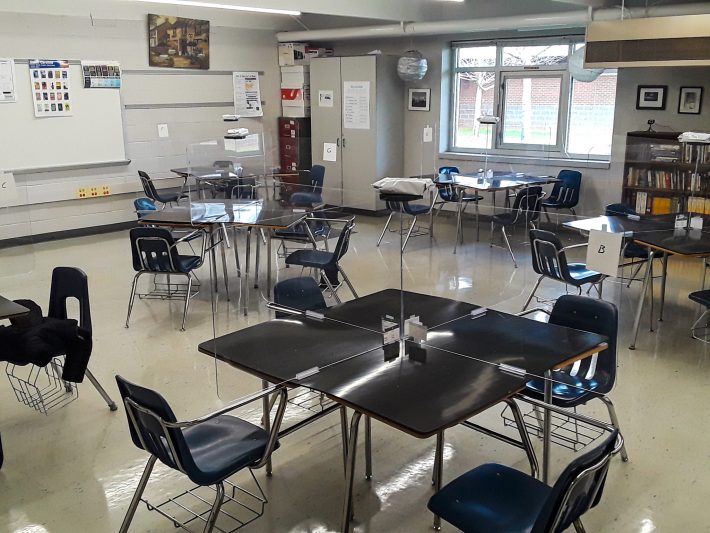I texted a picture to K this morning: “This is what my classroom looks like now,” I said.
“Wow — no more rearranging rooms, I guess,” she replied.
I know a lot of teachers are concerned about the impact this will have on their teaching style, on the types of lessons they can do. I for one am not terribly worried about that because this year I’m teaching only honors classes, and most honors students are relatively mature and somewhat adaptable. There are some things that will take getting used to — not as much motion, more teacher-based lessons, etc. — but overall, I think they’ll do fine.
When I got home, I noticed a little paper with Shakespearean insults on the table. Remembering that L’s class has just started Romeo and Juliet, I thought it might have been from her, but the Boy filled me in when he got home from swimming lessons: “The kids in challenge today were working on Shakespearean insults,” he said. He told me about how funny it was when his friends who went to challenge shared it with him, and I’m assuming he got K to help him find a list of insults on the internet and print them out.
It was only then that I realized: E didn’t get an invitation to join challenge when he started this year. The invitations are based on standardized test scores from second grade, and I immediately thought that the Boy must feel a little left out, a little, well, stupid compared to the others.
K had the same concerns, and we talked about it in the evening when the Boy was sound asleep. “He wanted to know if we could sign him up,” she said forlornly, “and I had to tell him you don’t sign up for it; you get an invitation.”
I remember seeing the challenge kids leave — our district was a little worse in their naming: it was the “gifted and talented” group, which makes everyone else feel less gifted, less talented, and that’s exactly how I felt. I watched them troop out of the classroom in elementary school, wondering what they do there, wondering why I wasn’t a part of it.
I got an invitation at the end of fifth grade and spent sixth grade with the GT kids who’d been doing it for several years by that time. I didn’t feel any different, really, and I don’t really recall doing anything all that spectacular. Of course, that was over 35 years ago, so I can justifiably be a little fuzzy on the details, I’m sure.
Throughout high school, I was most decidedly average. I was in the “advanced” classes only insofar as I was not in remedial English or remedial math. I didn’t take algebra until ninth grade; I never took a single AP course; I had no “Honors” affixed to my class names; I didn’t graduate anywhere near the top 10, and I highly doubt I was even in the top 10%. And yet for high school superlatives (how I loath to this day that idea), my peers voted me “Most Intellectual.” (I was tempted to refuse the award during the senior luncheon, but my mother convinced me it would be rude to do so.) So the recognition for my academic achievement was a mixed bag — conflicting signals. In the end, I just didn’t put much stock into what people thought of my intellectual abilities.
But somehow, when it comes to my kids, I feel a little differently. I want them to be geniuses, above and beyond even those who are above and beyond. What parent doesn’t?
The Boy is starting to realize some people work faster than he does, maybe a little more accurately, K and I concluded. And that’s fine. We’re all different. We all have different gifts. But still, I felt the Boy’s sting just a bit, so I went back to his bedroom and cuddled with him a little more.
“You’re very gifted in many ways,” I told him.
“How?”
“You’re a very good reader. You’re an excellent drawer. And you’re very kind and sensitive to other people’s needs and emotions.”
A pause. “Thank you.” He snuggled in a little closer and went to sleep.

0 Comments